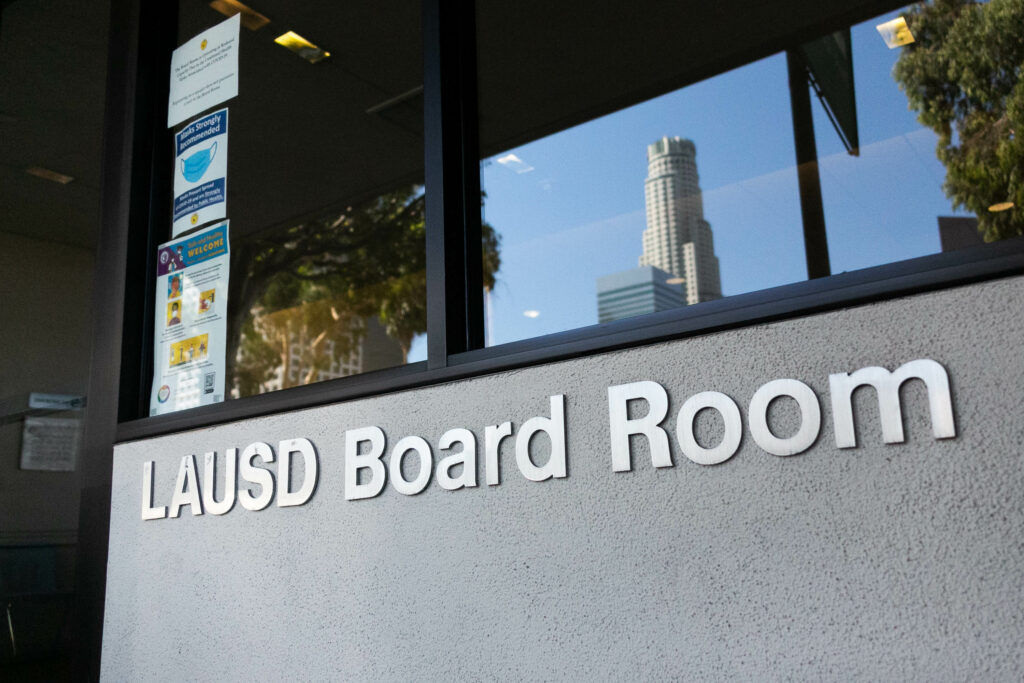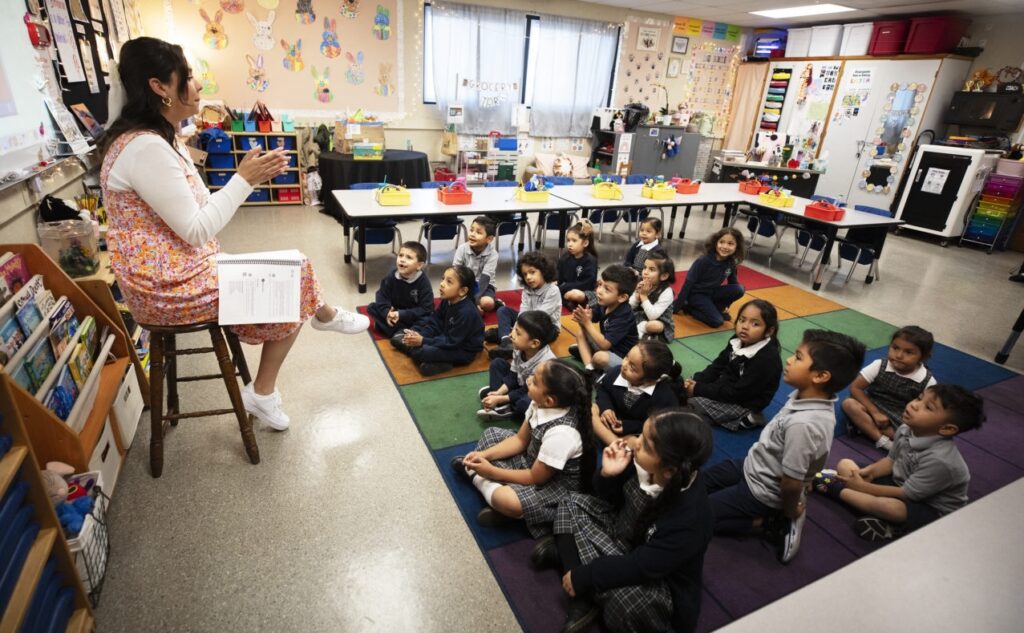
Credit: Julie Leopo/EdSource
Despite Superintendent Alberto Carvalho’s promise two years ago to settle the conflict, Los Angeles Unified continues denying millions of dollars in federal aid that the Archdiocese of Los Angeles argues it is owed for ongoing services to low-income students in Catholic schools. The archdiocese maintains that the district is diverting the money to bolster its students’ funding.
Both the California and the U.S. departments of education have chastised the district for breaking federal regulations in dealings with the archdiocese. Now, a Los Angeles County Superior Court judge has ordered the district to turn over documents and data that it withheld.
That information, which should illuminate the district’s decisions, could either restart stalemated talks or lead the archdiocese to turn to the courts to order a settlement after seven years of fighting.
“We do not believe further litigation is necessary, and we can achieve equity for non-public school students,” said Paul Escala, the archdiocese’s superintendent of schools. “However, we will pursue all means to see that all students receive their legally entitled services.”
Title I rules for private schools
Congress requires that low-income students in private and public schools receive equivalent Title I funding to pay for counseling, tutoring, teacher aides, and learning specialists. The dispute with LAUSD concerns how much money should be allocated for the archdiocese’s schools and how to ensure the funding gets to the students.
Under Congress’s rules, private and religious schools do not receive Title I funding directly. Instead, districts determine the eligibility of private and religious schools within their borders, administer the funding, and provide the services directly or through vendors after consulting with the schools. Los Angeles Unified, until recently, hired the Title I staff and put them on its payroll (see Frequently Asked Questions by the California Department of Education).
The system worked amicably for years. Districts can choose from several ways to determine Title I eligibility, and LA Unified picked the fairest and most efficient method for the 100-plus schools within the archdiocese with low-income students, Escala said. The district used census data to determine the number of Title I-eligible students in an attendance area, then awarded a proportionate share of the money to archdiocese schools. Long Beach Unified uses the same method.
More paperwork, more confusion, less money
Then in 2018-19 and the following year, coinciding with the new administration of Superintendent Austin Beutner, the district chose another option for calculating private schools’ eligibility — student registrations for the federal school lunch program. Not only did this method require a lot more time, paperwork and verification by the schools, but the district changed the reporting rules several times with little notice and failed “to engage in timely and meaningful consultation,” the California Department of Education concluded in a 58-page report issued in June 2021 in response to a formal complaint by the archdiocese.
Los Angeles Unified’s Office of Inspector General removed hundreds of students’ eligibility after examining parents’ school lunch forms in the two dozen schools it chose to audit and failed to include any students from other schools it didn’t audit.
The result was to cut Title I funding to the archdiocese by more than 92%, from about $9.5 million in services 2017-18 for 102 schools to $767,000 for fewer than two dozen schools, according to Escala. In 2023-24, funding crept up to about $2 million for 43 schools. The district cut its total share allocated to private schools from between 2% and 2.6% of about $291 million to 0.5%, according to the California Department of Education.
‘Totally unreasonable’ demands
The state Department of Education harshly criticized the district. The timetable for demanding documentation was “totally unreasonable,” and the district “engaged in a pattern of arbitrary unilateral decisions” and failed to justify its decisions to the archdiocese, the report said.
In ignoring the archdiocese’s Public Records Act requests for documentation to justify the cuts, the district took a “hide-the-ball approach (that) breached both the spirit and the letter” of the law, the report said.
The spirit of Title I, as stated in the law’s preamble, Escala said, is to maximize participation. The intent of other options like surveys and free-lunch verification is for schools to prove they have higher proportions of low-income families than neighboring schools, he said.
LAUSD is doing the opposite, Escala said.
“The district’s using these other methods as a way of filtering and screening and reducing participation,” he said. “You’re extracting children you know qualify simply because a “t” wasn’t crossed or an “i” wasn’t dotted. It is beyond reproach, because they (LAUSD officials) don’t apply the same standard to their own schools.”
LAUSD had an obligation to give (the Archdiocese) the requested information. LAUSD’s hide-the-ball approach breached both the spirit and the letter of the duty to consult. — The California Department of Education in a June 2021 ruling
LA Unified declined to comment on the state’s report, and last week, a spokesperson wrote in an email that “Los Angeles Unified does not typically comment on pending or ongoing litigation.”
Districts have a financial incentive to minimize private schools’ funding eligibility. The federal government awards the total Title I funding to districts, which determine how much should be allocated for services to private and religious school students. Lawyers for the archdiocese point out that the less money that districts award, the more Title I funding they can spend on their own students.
The district appears to understand this, said Kevin Troy, an attorney for the archdiocese, citing a Jan. 29, 2019, email from the principal auditor of the district’s Office of the Inspector General to the archdiocese, in which the auditor stated that the archdiocese “receives over $10 million of Title I funds from the LAUSD every year — money that could otherwise be allocated to LAUSD schools.”
“There’s a moral and ethical question on the table,” Escala said. “You (LA Unified) have got children in need, and you’re not serving them right,” he added, referring to students in archdiocese schools.
The impact on one high school
Mark Johnson, principal of Bishop Mora Salesian High School, has seen the effect of the cuts on students. Before the cutback, Title I paid for a reading intervention teacher and part-time aide who worked with 40 to 50 students weekly — about 1 out of 8 students at the all-boy, 400-student school in the low-income Boyle Heights neighborhood of Los Angeles. Although on the district’s payroll, the teacher fit in like any other staff member, building personal relationships with the students and collaborating with their teachers.
“She (the teacher) had her own classroom and was just a regular teacher as far as any of our kids knew,” he said. She would work with the lowest-performing students on basic reading comprehension skills. “If they were working on a tough piece of literature, she would help them break it down so that they could write an analytical paragraph or essay.”
Pulling out students also reduced the class size for the remaining students, he said. Now, there is only enough money for a two-day-a-week coach from a contractor who sees at most a dozen students a week.
“We’re serving kids who are significantly behind grade level and families that deal with poverty and all the things that come along with that,” Johnson said. “So this kind of antagonistic relationship that has developed (with the district) ultimately hurts kids.”
The California Department of Education gave the district 60 days from its June 2021 ruling to consult with the archdiocese to fix deficiencies pointed out in the report and then recalibrate the proportional share of Title I funding for archdiocese schools. It ordered the district to begin providing the increased services for 2020-21, the next school year.
Instead, the district appealed the decision to the U.S. Department of Education, which issued its own findings in November 2023. In his decision, Adam Schott, deputy assistant secretary for policy and programs, found that the district could justify reducing the eligibility count based on its analysis of parents’ forms. But by doing that, they cut the funding for the dozens of schools that the district did not audit. He credited the district with consulting with the archdiocese to an extent, but said the district’s overall approach in demanding documentation was “inconsistent and confusing.”
Schott also ruled that the district violated federal regulations by claiming it didn’t have to share data with the archdiocese on how much it spent on Title I services for students and how much was unspent at the end of each year.
In December 2021, the archdiocese sued the district in Los Angeles Superior Court for ignoring multiple requests under the state Public Records Act to turn over Title I spending records and other relevant information. The court held off ruling until the complaint process played out.
On July 16, Judge Curtis Kin ordered the district to turn over all relevant documents, emails and records to the archdiocese by Aug. 20 and to pay $82,141 to the diocese in attorneys’ fees.
An appeal to Superintendent Carvalho
Weeks after he started work as Los Angeles Unified superintendent in February 2022, Alberto Carvalho told EdSource he had familiarized himself with the case and added, “I’m going to resolve this issue sooner rather than later.” He declined to elaborate due to litigation.
“What I can tell you,” he added, “is that we need more objective, transparent tools by which we assess and fund this guaranteed federal entitlement that’s driven by poverty.”
Escala said he remains hopeful. “I believe that Superintendent Carvalho has the ability to direct his staff towards that outcome. I have a great degree of confidence that when brought to him, this can get adjudicated appropriately.”


